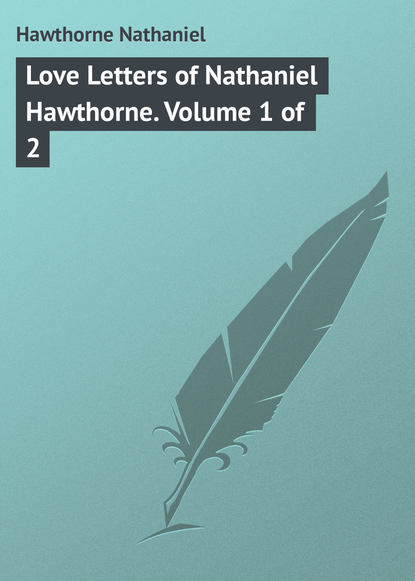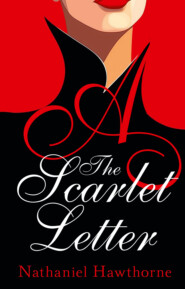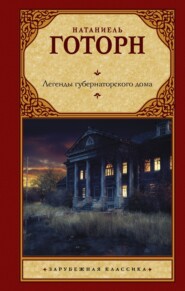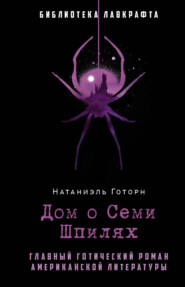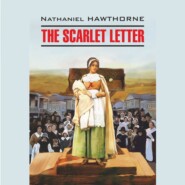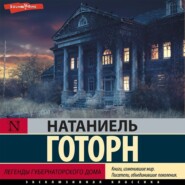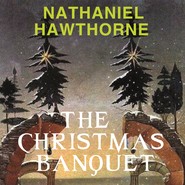По всем вопросам обращайтесь на: info@litportal.ru
(©) 2003-2025.
✖
Love Letters of Nathaniel Hawthorne. Volume 1 of 2
Автор
Год написания книги
2017
Настройки чтения
Размер шрифта
Высота строк
Поля
April 1st. Before breakfast. – Good morning, entirely belovedest.
Sophie Hawthorne, I have enclosed something for thee in this letter. If thou findest it not, then tell me what thou art.
Miss Sophia A. Peabody,
Care of Dr. N. Peabody,
Salem, Mass.
TO MISS PEABODY
Boston, April 3d, 1840. – Evening.
Blessedest wife, thy husband has been busy all day, from early breakfast-time to late in the afternoon; and old Father Time has gone onward somewhat less heavily, than is his wont when I am imprisoned within the walls of the Custom-House. It has been a brisk, breezy day, as thou knowest – an effervescent atmosphere; and I have enjoyed it in all its freshness, breathing air which had not been breathed in advance by the hundred thousand pairs of lungs which have common and indivisible property in the atmosphere of this great city. – My breath had never belonged to anybody but me. It came fresh from the wilderness of ocean. My Dove ought to have shared it with me, and so have made it infinitely sweeter – save her, I would wish to have an atmosphere all to myself. And, dearest, it was exhilarating to see the vessels, how they bounded over the waves, while a sheet of foam broke out around them. I found a good deal of enjoyment, too, in the busy scene around me; for several vessels were disgorging themselves (what an unseemly figure is this – "disgorge," quotha, as if the vessels were sick at their stomachs) on the wharf; and everybody seemed to be working with might and main. It pleased thy husband to think that he also had a part to act in the material and tangible business of this life, and that a part of all this industry could not have gone on without his presence. Nevertheless, my belovedest, pride not thyself too much on thy husband's activity and utilitarianism; he is naturally an idler, and doubtless will soon be pestering thee with bewailments at being compelled to earn his bread by taking some little share in the toils of mortal man.
Most beloved, when I went to the Custom-House, at one o'clock, Colonel Hall held up a letter, turning the seal towards me; and he seemed to be quite as well aware as myself, that the long-legged little fowl impressed thereon was a messenger from my Dove. And so, naughtiest, thou art not patient. Well; it will do no good to scold thee. I know Sophie Hawthorne of old – yea, of very old time do I know her; or rather, of very old eternity. There was an image of such a being, deep within my soul, before we met in this dim world; and therefore nothing that she does, or says, or thinks, or feels, ever surprises me. Her naughtiness is as familiar to me as if it were my own. But dearest, do be patient; because thou seest that the busy days are coming again; and how is thy husband to bear his toil lightsomely, if he knows that thou art impatient and disquieted. By and bye, as soon as God will open a way to us, we will help one another bear the burthen of the day, whatever it may be.
My little Dove, the excellent Colonel Hall, conceiving, I suppose, that our correspondence must necessarily involve a great expenditure of paper, has imparted to thy husband a quire or two of superfine gilt-edged, which he brought from Congress. The sheet on which I am now writing is a specimen; and he charged me to give thee a portion of it, which I promised to do – but whether I shall convey it to thee in the mass, or sheet by sheet, after spoiling it with my uncouth scribble, is yet undetermined. Which wouldst thou prefer? Likewise three sticks of sealing-[wax] did the good Colonel bestow; but unfortunately it is all red. Yet I think it proper enough that a gentleman should seal all his letters with red sealing-wax; though it is sweet and graceful in my Dove to use fancy-colored. Dearest, the paper thou shalt have, every sheet of it, sooner or later; and only that it is so burthensome to thy foolish husband to carry anything in his hand, I would bring it to thee. Meantime, till I hit upon some other method, I will send it sheet by sheet.
Miss Sophia A. Peabody,
Care of Dr. N. Peabody,
Salem, Mass.
TO MISS PEABODY
Custom-House, April 6th, 1840. 5 P.M.
How long it is, belovedest, since I have written thee a letter from this darksome region. Never did I write thee a word from hence that was worth reading, nor shall I now; but perhaps thou wouldst get no word at all, these two or three days, unless I write it here. This evening, dearest, I am to have a visitor – the illustrious Colonel Hall himself; and I have even promised him a bed on my parlor floor – so that, as thou seest, the duties of hospitality will keep me from communion with the best little wife in the world.
Hearts never do understand the mystery of separation – that is the business of the head. My sweetest, dearest, purest, holiest, noblest, faithfullest wife, dost thou know what a loving husband thou hast? Dost thou love him most immensely? – beyond conception, and dost thou feel, as he does, that every new throb of love is worth all other happiness in the world?
Dearest, my soul drank thy letter this forenoon, and has been conscious of it ever since, in the midst of business and noise and all sorts of wearisome babble. How dreamlike it makes all my external life, this continual thought and deepest, inmostest musing upon thee! I live only within myself; for thou art always there. Thou makest me a disembodied spirit; and with the eve of a spirit, I look on all worldly things – and this it [is] that separates thy husband from those who seem to be his fellows – therefore is he "among them, but not of them." Thou art transfused into his heart, and spread all round about it; and it is only once in a while that he himself is even imperfectly conscious of what a miracle has been wrought upon him.
Well, dearest, were ever such words as these written in a Custom-House before? Oh, and what a mighty heave my heart has given, this very moment! Thou art most assuredly thinking of me now, wife of my inmost bosom. Never did I know what love was before – I did not even know it when I began this letter. Ah, but I ought not to say that; it would make me sad to believe that I had not always loved thee. Farewell, now, dearest. Be quiet, my Dove; lest my heart be made to flutter by the fluttering of thy wings.
April 7th. 6 P.M. My tenderest Dove, hast thou lived through the polar winter of to-day; for it does appear to me to have been the most uncomfortable day that ever was inflicted on poor mortals. Thy husband has had to face it in all its terrors; and the cold has penetrated through his cloak, through his beaver-cloth coat and vest, and was neutralised nowhere but in the region round about his heart – and that it did not chill him even there, he owes to thee. I know not whether I should not have jumped overboard in despair today, if I had not sustained my spirit by the thought of thee, most beloved wife; for, besides the bleak, unkindly air, I have been plagued by two sets of coal-shovellers at the same time, and have had to keep two separate tallies simultaneously. But, dearest, I was conscious that all this was merely a vision and a phantasy, and that, in reality, I was not half-frozen by the bitter blast, nor plagued to death by those grimy coal-heavers, but that I was basking quietly in the sunshine of eternity, with mine own Dove. Any sort of bodily and earthly torment may serve to make us sensible that we have a soul that is not within the jurisdiction of such shadowy demons – it separates the immortal within us from the mortal. But the wind has blown my brain into such confusion that I cannot philosophise now.
Blessingest wife, what a habit I have contracted of late, of telling thee all my grievances and annoyances, as if such trifles were worth telling – or as if, supposing them to be so, they would be the most agreeable gossip in the world to thee. Thou makest me behave like a child, naughtiest. Why dost thou not frown at my nonsensical complaints, and utterly refuse thy sympathy? But I speak to thee of the miseries of a cold day, and blustering wind, and intractable coal-shovellers, with just the same certainty that thou wilt listen lovingly and sympathisingly, as if I were speaking of the momentous and permanent concerns of life.
Dearest, … (portion of letter missing)
I do not think that I can come on Friday – there is hardly any likelihood of it; for one of the Measurers is indisposed, which throws additional work on the efficient members of our honorable body. But there is no expressing how I do yearn for thee! The strength of the feeling seems to make my words cold and tame. Dearest, this is but a poor epistle, yet is written in very great love and worship of thee – so, for the writer's sake, thou wilt receive it into thy heart of hearts. God keep thee – and me also for thy sake.
Thine Ownest.
Miss Sophia A. Peabody,
Care of Dr. N. Peabody,
Salem, Mass.
TO MISS PEABODY
Boston, April 15th, 1840. – Afternoon.
Belovedest – since writing this word, I have made a considerable pause; for, dearest, my mind has no activity to-day. I would fain sit still, and let thoughts, feelings, and images of thee, pass before me and through me, without my putting them into words, or taking any other trouble about the matter. It must be that thou dost not especially and exceedingly need a letter from me; else I should feel an impulse and necessity to write. I do wish, most beloved wife, that there were some other method of communing with thee at a distance; for really this is not a natural one to thy husband. In truth, I never use words, either with the tongue or pen, when I can possibly express myself in any other way; – and how much, dearest, may be expressed without the utterance of a word! Is there not a volume in many of our glances? – even in a pressure of the hand? And when I write to thee, I do but painfully endeavor to shadow into words what has already been expressed in those realities. In heaven, I am very sure, there will be no occasion for words; – our minds will enter into each other, and silently possess themselves of their natural riches. Even in this world, I think, such a process is not altogether impossible – we ourselves have experienced it – but words come like an earthy wall betwixt us. Then our minds are compelled to stand apart, and make signals of our meaning, instead of rushing into one another, and holding converse in an infinite and eternal language. Oh, dearest, have [not] the moments of our oneness been those in which we were most silent? It is our instinct to be silent then, because words could not adequately express the perfect concord of our hearts, and therefore would infringe upon it. Well, ownest, good bye till tomorrow, when perhaps thy husband will feel a necessity to use even such a wretched medium as words, to tell thee how he loves thee. No words can tell it now.
April 15th. Afternoon. – Most dear wife, never was thy husband gladder to receive a letter from thee than to-day. And so thou didst perceive that I was rather out of spirits on Monday. Foolish and faithless husband that I was, I supposed that thou wouldst not take any notice of it; but the simple fact was, that I did not feel quite so well as usual; and said nothing about it to thee, because I knew thou wouldst desire me to put off my departure, which (for such a trifle) I felt it not right to do – and likewise, because my Dove would have been naughty, and so perhaps have made herself ten times as ill as her husband. Dearest, I am quite well now – only very hungry; for I have thought fit to eat very little for two days past; and I think starvation is a remedy for almost all physical evils. You will love Colonel Hall, when I tell you that he has not let me do a … (few words missing) … and even to-day he has sent me home to my room, although I assured him that I was perfectly able to work. Now, dearest, it thou givest thyself any trouble and torment about this past indisposition of mine, I shall never dare to tell thee about my future incommodities; but if I were sure thou wouldst estimate them at no more than they are worth, thou shouldst know them all, even to the slightest prick of my finger. It is my impulse to complain to thee in all griefs, great and small; and I will not check that impulse, if thou wilt sympathise reasonably, as well as most lovingly. And now, ownest wife, believe that thy husband is well; – better, I fear, than thou, who art tired to death, and hast even had the headache. Naughtiest, dost thou think that all the busts in the world, and all the medallions and other forms of sculpture, would be worth creating at the expence of such weariness and headaches to thee. I would rather that thy art should be annihilated, than that thou shouldst always pay this price for its exercise. But perhaps, when thou hast my bosom to repose upon, thou wilt no longer feel such overwhelming weariness. I am given thee to repose upon, that so my most tender and sensitivest little Dove may be able to do great works.
And dearest, I do by no means undervalue thy works, though I cannot estimate all thou hast ever done at the price of a single throb of anguish to thy belovedest head. But thou has achieved mighty things. Thou hast called up a face which was hidden in the grave – hast re-created it, after it was resolved to dust – and so hast snatched from Death his victory. I wonder at thee, my beloved. Thou art a miracle thyself, and workest miracles. I would not have believed it possible to do what thou hast done – to restore the lineaments of the dead so perfectly that even she who loved him so well can require nothing more; – and this too, when thou hadst hardly known his living face. Thou couldst not have done it, unless God had helped thee. This surely was inspiration, and of the holiest kind, and for one of the holiest purposes.
Dearest, I shall long to see thee exceedingly next Saturday; but having been absent from duty for two or three days past it will not be right for me to ask any more time so soon. Dost thou think it would?
How naughty was thy husband to waste the first page of this letter in declaiming against the blessed art of writing! I do not see how I could live without it; – thy letters are my heart's food; and oftentimes my heart absolutely insists upon pouring itself out on paper, for thy perusal. In truth, if the heart would do all the work, I should probably write to thee the whole time of my absence; but thou knowest that the co-operation of the hand and head are indispensable; and they, not being able to comprehend the infinite necessity of the heart's finding utterance, are sometimes sluggish.
April 17th. – Before breakfast. – Ownest, I am perfectly well this morning. Dost thou love me? Dearest, expect not another letter till Tuesday. Is thy weariness quite gone?
Thine Ownest, Ownest Husband.
Miss Sophia A. Peabody,
Care of Dr. N. Peabody,
Salem, Mass.
TO MISS PEABODY
Boston, April 19th, 1840. – Forenoon.
Dearest, there came no letter from thee yesterday; and I have been a little disquieted with fears that thou art not well and art naughty enough to conceal it from thy husband. But this is a misdemeanor of which my Dove ought not to be lightly suspected. Or perhaps, ownest wife, thou didst imagine that I might mean to surprise thee by a visit, last evening, and therefore, instead of writing, didst hope to commune with me in living words. Best belovedest, if I could have come, I would have given thee notice beforehand; for I love not surprises, even joyful ones – or at least, I would rather that joy should come quietly, and as a matter of course, and warning us of its approach by casting a placid gleam before it. Mine own wife, art thou very well? Thy husband is so, only love-sick – a disease only to be cured by the pressure of a certain heart to his own heart.
Belovedest, what a beautiful day was yesterday. Wert thou abroad in the sky and air? Thy husband's spirit did rebel against being confined in his darksome dungeon, at the Custom-House; it seemed a sin – a murder of the joyful young day – a quenching of the sunshine. Nevertheless, there he was kept a prisoner, – till it was too late to fling himself on a gentle wind and be blown away into the country. I foresee, dearest, that thou wilt, now that the pleasant days of May and June are coming, be tormented quite beyond thine infinite patience, with my groans and lamentations at being compelled to lose so much of life's scanty summertime. But thou must enjoy for both of us. Thou must listen to the notes of the birds, because the rumbling of wheels will be always in my ears – thou must fill thyself with the fragrance of wild flowers, because I must breathe in the dust of the city – thy spirit must enjoy a double share of freedom, because thy husband is doomed to be a captive. It is thine office now, most sweet wife, to make all the additions that may be made to our common stock of enjoyment. By and bye, there shall not be so heavy burthen imposed upon thee. When I shall be again free, I will enjoy all things with the fresh simplicity of a child of five years old; thou shalt find thine husband grown young again, made over all anew – he will go forth and stand in a summer shower, and all the worldly dust that has collected on him shall be washed away at once. Then, dearest, whenever thou art aweary, thou shalt lie down upon his heart as upon a bank of fresh flowers.
Nearly 6 – P.M. Thy husband went out to walk, dearest, about an hour ago, and found it very pleasant, though there was a somewhat cool wind. I went round and across the common, and stood on the highest point of it, whence I could see miles and miles into the country. Blessed be God for this green tract, and the view which it affords; whereby we poor citizens may be put in mind, sometimes, that all God's earth is not composed of brick blocks of houses, and of stone or wooden pavements. Blessed be God for the sky too; though the smoke of the city may somewhat change its aspect – but still it is better than if each street were covered over with a roof. There were a good many people walking on the mall, mechanicks apparently and shopkeepers' clerks, with their wives and sweethearts; and boys were rolling on the grass – and thy husband would have liked to lie down and roll too. Wouldst thou not have been ashamed of him? And, Oh, dearest, thou shouldst have been there, to help me to enjoy the green grass, and the far-off hills and fields – to teach me how to enjoy them, for when I view Nature without thee, I feel that I lack a sense. When we are together, thy whole mind and fancy, as well as thy whole heart, is mine; so that all thy impressions from earth, sea, and sky, are added to all mine. How necessary hast thou made thyself to thy husband, my little Dove! When he is weary and out of spirits, his heart yearneth for thee; and when he is among pleasant scenes, he requireth thee so much the more.
My dearest, why didst thou not write to me, yesterday? It were always advisable, methinks, to arrange matters so that a letter may be sent on each Saturday, when I am not coming home; because Sunday leaves me free to muse upon thee, and to imagine the state and circumstances in which thou art – and the present Sunday I have been troubled with fancies that thou art ill of body or ill at ease in mind. Do not thou have any such foolish fancies about me, mine ownest. Oh, how we find, at every moment of our lives, that we ought always to be together! Then there would be none of these needless heartquakes; but now how can they be avoided, when we mutually feel that one-half our being is wandering away by itself, without the guidance and guard of the other half! Well; it will not be always so. Doubtless, God has planned how to make us happy; but thy husband, being of a rebellious and distrustful nature, cannot help wishing sometimes that our Father would let him into His plans.
TO MISS PEABODY
Boston, April 21st, 1840. – Custom-House.
I do trust, my dearest, that thou hast been enjoying this bright day for both of us; for thy husband has spent it in his dungeon – and the only ray of light that broke upon him, was when he opened thy letter. Belovedest, I have folded it to my heart, and ever and anon it sends a thrill through me; for thou hast steeped it with thy love – it seems as if thy head were leaning against my breast. I long to get home, that I may read it again and again; for in this uncongenial region, I can but half comprehend it – at least, I feel that there is a richness and sweetness in it, too sacred to be enjoyed, save in privacy. Dearest wife, thy poor husband is sometimes driven to wish that thou and he could mount upon a cloud (as we used to fancy in those heavenly walks of ours) and be borne quite out of sight and hearing of all the world; – then, at last, our souls might melt into each other; but now, all the people in the world seem to come between us. How happy were Adam and Eve! There was no third person to come between them, and all the infinity around them only served to press their hearts closer together. We love [one] another as well as they: but there is no silent and lovely garden of Eden for us. Mine own, wilt thou sail away with me to discover some summer island? – dost thou not think that God has reserved one for us, ever since the beginning of the world? Ah, foolish husband that I am, to raise a question of it, when we have found such an Eden, such an island sacred to us two, whenever, whether in Mrs. Quincy's boudoir, or anywhere else, we have been clasped in one another's arms! That holy circle shuts out all the world – then we are the Adam and Eve of a virgin earth. Now good-bye dearest; for voices are babbling around me, and I should not wonder if thou wert to hear the echo of them, while thou readest this letter.
April 22d – 6 o'clock P.M. To-day, dearest, I have been measuring salt, on Long-Wharf; and though considerably weary, I feel better satisfied than if I had been murdering the blessed day at the Custom-House. Mine own wife, how very good wast thou, to take me with thee on that sweet walk, last Monday! And how kind-hearted was that sensible old stump! Thou enquirest whether I ever heard a stump speak before. No, indeed; but "stump-speeches" (as thou mayst learn in the newspapers) are very common in the western country. Belovedest, I have met with an immense misfortune. Dost thou sympathise from the bottom of thy heart? Wouldst thou take it upon thyself, if possible? Yea; I know thou wouldst, even without asking the nature of it; and truth to tell, I could be selfish enough to wish that thou mightest share it with me. Now art thou all in a fever of anxiety! I feel the fluttering of thy foolish little heart. Shall I tell thee? No. – Yes; I will. I have received an invitation to a party at General McNeil's, next Friday evening. Why will not people let your poor persecuted husband alone? What possible good can it do for me to thrust my coal-begrimed visage and salt-befrosted locks into good society? What claim have I to be there – a humble Measurer, a subordinate Custom-House officer, as I am! I cannot go. I will not go. I intend to pass that evening with my wife – that is to say, in musings and dreams of her, and moreover, it was an exceeding breach of etiquette, that this belovedest wife was not included in the invitation.
My duties began at sunrise, after a somewhat scanty night's rest; for George Hillard and his brother, from London, came to see me, when I was preparing to go [to] bed; and I was kept up pretty late. But I came home at about four o'clock, and straightway went to bed! What a sinful way was that of misusing this summer afternoon! I trust, most dear wife, that the better half of my being has drawn from the sweet day all the honey that it contained. I feel as if it were not so much matter, now, whether my days pass pleasantly or irksomely, since thou canst be living a golden life for both of us. Sometime or other, we will contribute each an equal share of enjoyment.





